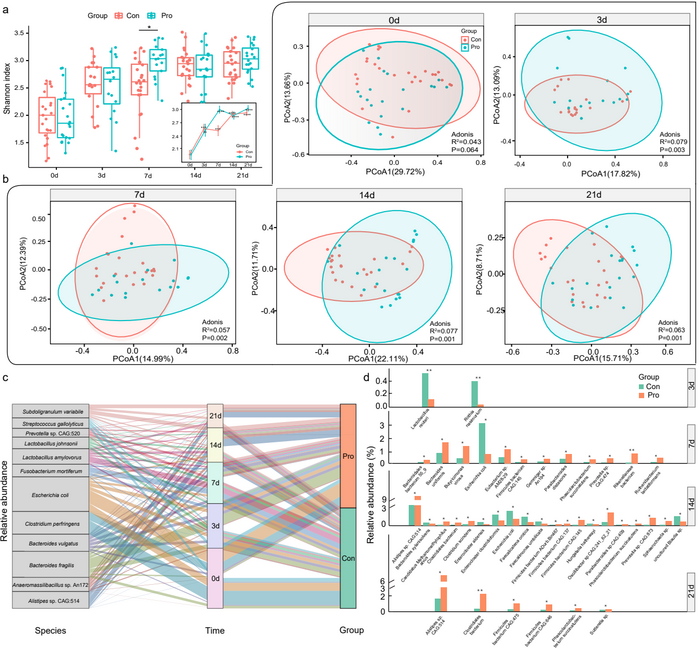This study is led by Prof. Heping Zhang (Inner Mongolia Key Laboratory of Dairy Biotechnology and Engineering, Inner Mongolia Agricultural University). One factor that shapes the establishment of early neonatal intestinal microbiota is environmental microbial exposure, and probiotic application has been shown to promote health and growth of piglets, but inferences drawn from different studies are largely inconsistent with rather low reproducibility. In addition, probiotic effects are known to be treatment-specific, largely depending on the applied probiotic strains and dose. On the other hand, host-related physiological and environmental factors may also influence the health-promoting effects of probiotic supplementation. It is therefore necessary to evaluate the specific effect of candidate probiotics in animal husbandry. This study aimed to investigate the effect of spraying a compound probiotic fermented liquid (CPFL; containing Lactobacillus casei Zhang, Lactobacillus plantarum P-8, and Lactobacillus rhamnosus Probio-M9; 1×109 CFU/mL) into the living environment of piglets on their early growth performance and immunity.

Credit: ©Science China Press
This study is led by Prof. Heping Zhang (Inner Mongolia Key Laboratory of Dairy Biotechnology and Engineering, Inner Mongolia Agricultural University). One factor that shapes the establishment of early neonatal intestinal microbiota is environmental microbial exposure, and probiotic application has been shown to promote health and growth of piglets, but inferences drawn from different studies are largely inconsistent with rather low reproducibility. In addition, probiotic effects are known to be treatment-specific, largely depending on the applied probiotic strains and dose. On the other hand, host-related physiological and environmental factors may also influence the health-promoting effects of probiotic supplementation. It is therefore necessary to evaluate the specific effect of candidate probiotics in animal husbandry. This study aimed to investigate the effect of spraying a compound probiotic fermented liquid (CPFL; containing Lactobacillus casei Zhang, Lactobacillus plantarum P-8, and Lactobacillus rhamnosus Probio-M9; 1×109 CFU/mL) into the living environment of piglets on their early growth performance and immunity.
This work included 68 piglets, which were randomized into probiotic and control groups. Blood and fecal samples were collected at 0, 3, 7, 14, and 21 days of age. Spraying CPFL significantly reshaped the microbiota composition of the delivery room environment, increased piglets’ daily weight gain and weaning weight (P<0.001), and modulated piglets’ serum cytokine levels (increases in IgA, IgG, and IL-10; decrease in IFN-γ; P<0.05 in each case) in piglets. Additionally, spraying CPFL during early days of life modified piglets’ gut microbiota structure and diversity, increased the abundance of some potentially beneficial bacteria (such as Bacteroides uniformis, Butyricimonas virosa, Parabacteroides distasonis, and Phascolarctobacterium succinatutens) and decreased the abundance of Escherichia coli (P<0.05). Interestingly, CPFL application also significantly enhanced the gut microbial bioactive potential and levels of several serum metabolites involved in the metabolism of vitamins (B2, B3, B6, and E), medium/long-chain fatty acids (caproic, tetradecanoic, and peptadecanoic acids), and dicarboxylic acids (azelaic and sebacic acids).
Our study demonstrated that spraying CPFL significantly could improve piglets’ growth performance and immunity, and the beneficial effects are associated with changes in the gut microbiota and host metabolism, expanding our knowledge of managing newborn animals with probiotics-based therapy.
See the article:
Spraying compound probiotics improves growth performance and immunity and modulates gut microbiota and blood metabolites of suckling piglets
https://link.springer.com/article/10.1007/s11427-022-2229-1
Journal
Science China Life Sciences
DOI
10.1007/s11427-022-2229-1




